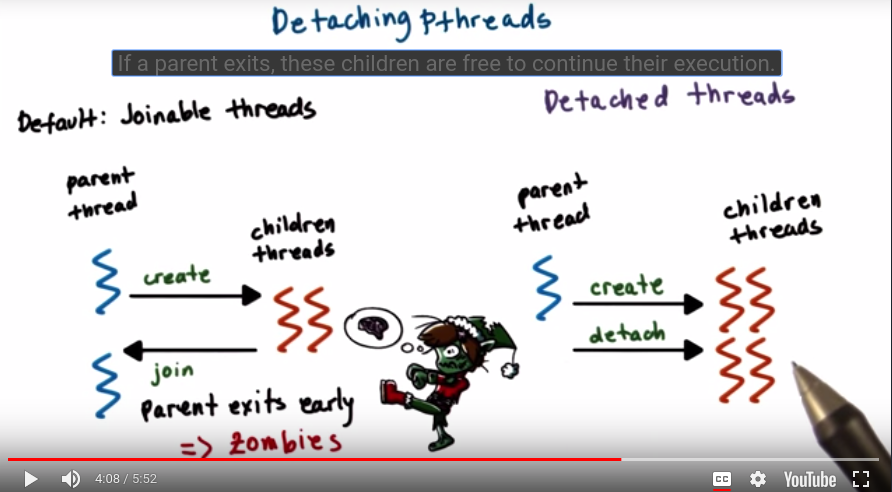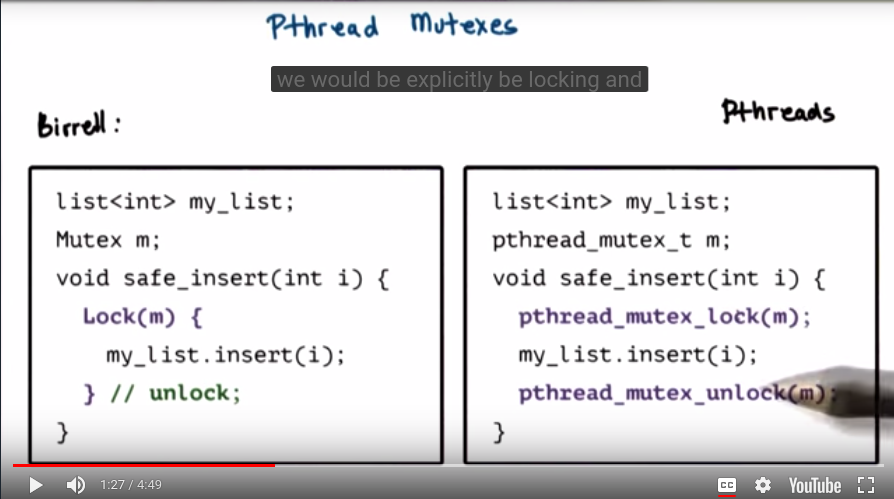PThreads
- PThreads == POSIX Threads
- POSIX == Portable Operating System Interface
Birrell's Mechanism:
- Thread
- Fork(proc, arg)
- thread creation
- join(thread)
Pthreads
- Thread: pthread_t aThread; // Type of thread
- Fork(proc, args): Thread creation
int pthread_create(pthread_t *thread, const pthread_attr_t *attr,
void * (*start_routine)(void *), void * arg);
- join (tread)
int pthread_join(pthread_t thread, void **status);
Pthread Attributes
int pthread_attr_init(pthread_attr_t *attr);
int pthread_attr_destroy(pthread_attr_t *attr);
pthread_attr_{set/get}{attribute} // set the value, read value
- specified in pthread_create
defines features of the new thread
- stack size; scheduling policy; priority; inheritance; joinable; system/process scope etc
has default behavior with NULL in pthread_create
detaching pthread
- default: joinable threads
- the parent should not terminate until it's child complete its tasks
- and have been joined by children via the explicit join operation
- if parents exits early ==> children will become zombie! (no one adopt them!)
- detached threads:
- for this thread, when parent exit, children can continue their execution
- make the parent and children equivalent to each other.

int pthread_detach();
pthread_attr_setdetachstate(attr, PTHREAD_CREATE_DECATHED);
An example of Pthread creation with detachingpthread
/* PThread Creation */
#include <stdio.h>
#include <pthread.h>
void *foo (void *arg) { /* thread main */
printf("Foobar!\n");
pthread_exit(NULL);
}
int main (void) {
int i;
pthread_t tid;
pthread_attr_t attr;
pthread_attr_init(&attr); // Required!!!
pthread_attr_setdetachstate(&attr, PTHREAD_CREATE_DETACHED); // make it detached
pthread_attr_setscope(&attr, PTHREAD_SCOPE_SYSTEM);
pthread_create(&tid, &attr, foo, NULL);
return 0;
}
Pthread creation example
/* PThread Creation Quiz 1 */
#include <stdio.h>
#include <pthread.h>
#define NUM_THREADS 4
void *hello (void *arg) { /* thread main */
printf("Hello Thread\n");
return 0;
}
int main (void) {
int i;
pthread_t tid[NUM_THREADS];
for (i = 0; i < NUM_THREADS; i++) { /* create/fork threads */
pthread_create(&tid[i], NULL, hello, NULL);
}
for (i = 0; i < NUM_THREADS; i++) { /* wait/join threads */
pthread_join(tid[i], NULL);
}
return 0;
}
The output would be :
Hello Thread!
Hello Thread!
Hello Thread!
Hello Thread!
Thread Creation example 2
/* A Slightly Less Simple PThreads Example */
#include <stdio.h>
#include <pthread.h>
#define NUM_THREADS 4
void *threadFunc(void *pArg) { /* thread main */
int *p = (int*)pArg;
int myNum = *p;
// here, both *p and myNum are private variables
printf("Thread number %d\n", myNum);
return 0;
}
int main(void) {
int i;
pthread_t tid[NUM_THREADS];
for(i = 0; i < NUM_THREADS; i++) { /* create/fork threads */
pthread_create(&tid[i], NULL, threadFunc, &i);
}
for(i = 0; i < NUM_THREADS; i++) { /* wait/join threads */
pthread_join(tid[i], NULL);
}
return 0;
}
Quiz
All three answers are possible!!! (the weird third one!) Why?
Why?
- "i" is defined in main ==> it's globally visible variable!
- when it changes in one thread ==> all other threads see new value!!!
- This is called data race or race condition ==> a thread tries to read a value, while another thread modifies it!
To fix the race condition problem
- put it into an array! (505 HW1 use the same trick!)
- by Creating this array, it's like as if we created local storage/private storage for the arguments of every single one of the threads that we create.
/* PThread Creation Quiz 3 */
#include <stdio.h>
#include <pthread.h>
#define NUM_THREADS 4
void *threadFunc(void *pArg) { /* thread main */
int myNum = *((int*)pArg);
printf("Thread number %d\n", myNum);
return 0;
}
int main(void) {
int i;
int tNum[NUM_THREADS];
pthread_t tid[NUM_THREADS];
for(i = 0; i < NUM_THREADS; i++) { /* create/fork threads */
tNum[i] = i;
pthread_create(&tid[i], NULL, threadFunc, &tNum[i]);
}
for(i = 0; i < NUM_THREADS; i++) { /* wait/join threads */
pthread_join(tid[i], NULL);
}
return 0;
}
Pthread Mutexes
- to solve mutual exclusion problems among concurrent threads.
- only one thread at a time can perform modifications or otherwise access that shared variable.
Birrell's Mechanism:
- Mutex
//Pthreads
pthread_mutex_t aMutex; // mutex type
- Lock(mutex){}
//explicit lock
int pthread_mutex_lock(pthread_mutex_t *mutex);
//explicit ublock
int pthread_mutex_unlock(pthread_mutex_t *mutex);

Other Mutex operation
- first mutex must be explicitly initialize
int pthread_mutex_init(pthread_mutex_t *mutex, const pthread_mutexattr_t *attr);
//mutex attrubutes == specifies mutex behavior when a mutex is shared among proceses
int pthread_mutex_trylock(pthread_mutex_t *mutex);
// check the mutex, if it is in use, return immediately and notify the calling thread
// that the mutex is not available.
int pthread_mutex_destroy(pthread_mutex_t *mutex);
// and many others
Mutex safety tips
- shared data should always be accessed through a single mutex!
- mutex scope must be visible to all!!!!!
- globally order locks
- for all threads, lock mutexes in order. (make sure deadlock don't happen)
- always unlock a mutex and always unlock the correct one!
Pthread Condition Variables
Birrell's mechanisms:
- condition
- wait
- signal
- Broadcast
Pthread:
- contidion
pthread_cond_t aCond: // type of cond variable
- wait
- a thread that's entering the wait operation, a thread that must wait, will automatically release the mutex and place itself on the wait queue that's associate with the condition variable.
- when the thread is waken up, it will automatically re-acquire the mutex before actually exiting the wait operation.
int pthread_cond_wait(pthread_cond_t *cond, pthread_mutex_t *mutex);
- signal
int pthread_cond_signal(pthread_cond_t *cond);
- Broadcast
int pthread_cond_broadcast(pthread_cond_t, *cond);
Other condition variable operations
int pthread_cond_init(pthread_cond_t *cond, const pthread_condattr_t *attr);
int pthread_cond_destroy(pthread_cond_t *cond); // has to explicitly freed
Condition variable safety tips
- do not forget to notify waiting threads
- predicate change => signal/ broadcast correct condition variable
when in doubt weather you should use signal or broadcast, use broad cast until you figure out what the desired behaviour is.
- but will loss performance
you do not need a mutex to signal/broadcsat
Producer and Consumer example in Pthreads
#include <stdio.h>
#include <stdlib.h>
#include <pthread.h>
#define BUF_SIZE 3 /* Size of shared buffer */
int buffer[BUF_SIZE]; /* shared buffer */
int add = 0; /* place to add next element */
int rem = 0; /* place to remove next element */
int num = 0; /* number elements in buffer */
pthread_mutex_t m = PTHREAD_MUTEX_INITIALIZER; /* mutex lock for buffer */
pthread_cond_t c_cons = PTHREAD_COND_INITIALIZER; /* consumer waits on this cond var */
pthread_cond_t c_prod = PTHREAD_COND_INITIALIZER; /* producer waits on this cond var */
void *producer (void *param);
void *consumer (void *param);
int main(int argc, char *argv[]) {
pthread_t tid1, tid2; /* thread identifiers */
int i;
/* create the threads; may be any number, in general */
if(pthread_create(&tid1, NULL, producer, NULL) != 0) {
fprintf(stderr, "Unable to create producer thread\n");
exit(1);
}
if(pthread_create(&tid2, NULL, consumer, NULL) != 0) {
fprintf(stderr, "Unable to create consumer thread\n");
exit(1);
}
/* wait for created thread to exit */
pthread_join(tid1, NULL);
pthread_join(tid2, NULL);
printf("Parent quiting\n");
return 0;
}
/* Produce value(s) */
void *producer(void *param) {
int i;
for (i=1; i<=20; i++) {
/* Insert into buffer */
pthread_mutex_lock (&m);
if (num > BUF_SIZE) {
exit(1); /* overflow */
}
while (num == BUF_SIZE) { /* block if buffer is full */
pthread_cond_wait (&c_prod, &m);
}
/* if executing here, buffer not full so add element */
buffer[add] = i; // buffer is not full, so add elem
add = (add+1) % BUF_SIZE;
num++;
pthread_mutex_unlock (&m);
pthread_cond_signal (&c_cons);
printf ("producer: inserted %d\n", i);
fflush (stdout);
}
printf("producer quiting\n");
fflush(stdout);
return 0;
}
/* Consume value(s); Note the consumer never terminates */
void *consumer(void *param) {
int i;
while(1) {
pthread_mutex_lock (&m);
if (num < 0) {
exit(1);
} /* underflow */
while (num == 0) { /* block if buffer empty */
pthread_cond_wait (&c_cons, &m);
}
/* if executing here, buffer not empty so remove element */
i = buffer[rem];
rem = (rem+1) % BUF_SIZE; //wrap around condition
num--;
pthread_mutex_unlock (&m);
pthread_cond_signal (&c_prod);
printf ("Consume value %d\n", i); fflush(stdout);
}
return 0;
}